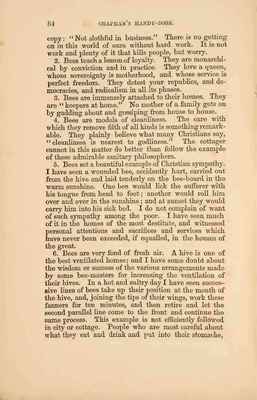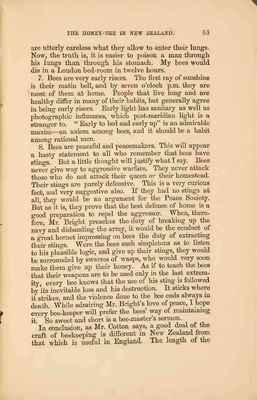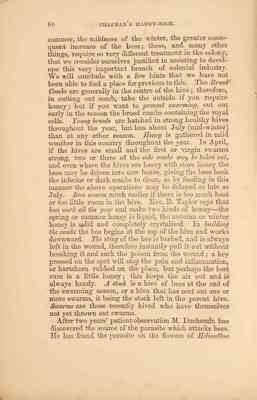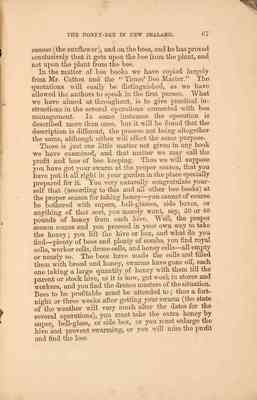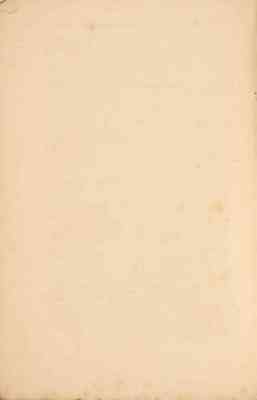Pages
64 CHAPMAN'S HANDY-BOOK.
copy: "Not slothful in business." There is no getting on in this world of ours without hard work. It is not work and plenty of it that kills people, but worry. 2. Bees teach a lesson of loyalty. They are monarchical by conviction and in practice. They love a queen, whose sovereignty is motherhood, and whose service is perfect freedom. They detest your republics, and democracies, and radicalism in all its phases. 3. Bees are immensely attached to their homes. They are "keepers at home." No mother of a family gets on by gadding about and gossiping from house to house. 4. Bees are models of cleanliness. The care with which they remove filth of all kinds is something remarkable. They plainly believe what many Christians say, "cleanliness is next to godliness." The cottager cannot in this matter do better than follow the example of these admirable sanitary philosophers. 5. Bees set a beautiful example of Christian sympathy. I have seen a wounded bee, accidently hurt, carried out from the hive and laid tenderly on the bee-board in the warm sunshine. One bee would lick the sufferer with his tongue from head to foot; another would roll him over and over in the sunshine; and at sunset they would carry him into his sick bed. I do not complain of want of such sympathy among the poor. I have seen much of it in the homes of the most destitute, and witnessed personal attentions and sacrifices and services which have never been exceeded, if equalled, in the houses of the great. 6. Bees are very fond of fresh air. A hive is one of the best ventilated homes; and I have some doubt about the wisdom or success of the various arrangements made by some bee-masters for increasing the ventilation of their hives. In a hot and sultry day I have seen successive lines of bees take up their position at the mouth of the hive, and, joining the tips of their wings, work these fanners for ten minutes, and then retire and let the second parallel line come to the front and continue the same process. This example is not efficiently followed in city or cottage. People who are most careful about what they eat and drink and put into their stomachs,
THE HONEY-BEE IN NEW ZEALAND. 65
are utterly careless what they allow to enter their lungs. Now, the truth is, it is easier to poison a man through his lungs than through his stomach. My bees would die in a London bed-room in twelve hours. 7. Bees are very early risers. The first ray of sunshine is their matin bell, and by seven o-clock p.m. they are most of them at home. People that live long and are healthy differ in many of their habits, but generally agree in being early risers. Early light has sanitary as well as photographic influences, which post-meridian light is a stranger to. "Early to bed and early up" is an admirable maxim - an axiom among bees, and it should be a habit among rational men. 8. Bees are peaceful and peacemakers. This will appear a hasty statement to all who remember that bees have stings. But a little thought will justify what I say. Bees never give way to aggressive warfare. They never attack those who do not attack their queen or their homestead. Their stings are purely defensive. This is a very curious fact, and very suggestive also. If they had no stings at all, they would be an argument for the Peace Society. But as it is, they prove that the best defence of home is a good preparation to repel the aggressor. When, therefore, Mr. Bright preaches the duty of breaking up the navy and disbanding the army, it would be the conduct of a great hornet impressing on bees the duty of extracting their stings. Were the bees such simpletons as to listen to his plausible logic, and give up their stings, they would be surrounded by swarms of wasps, who would very soon make them give up their honey. As if to teach the bees that their weapons are to be used only in the last extremity, every bee knows that the use of his sting is followed by its inevitable loss and his destruction. It sticks where it strikes, and the violence done to the bee ends always in death. While admiring Mr. Bright's love of peace, I hope every bee-keeper will prefer the bees' way of maintaining it. So sweet and short is a bee-master's sermon. In conclusion, as Mr. Cotton says, a good deal of the craft of beekeeping is different in New Zealand from that which is useful in England. The length of the
66. CHAPMAN'S HANDY-BOOK
summer, the mildness of the winter, the greatest consequent increase of the bees; these, and many other things, require so very different treatment in the colony, that we consider ourselves justified in assisting to develope this very important branch of colonial industry. We will conclude with a few hints that we have not been able to find a place for previous to this. The Brood* Combs are generally in the centre of the hive; therefore, in cutting out comb, take the outside if you require honey; but if you want to prevent swarming, cut out early in the season the brood combs containing the royal cells. Young broods are hatched in strong healthy hives throughout the year, but less about July (mid-winter) than at any other season. Honey is gathered in mild weather in this country throughout the year. In April, if the hives are small and the first or virgin swarms strong, two or three of the side combs may be taken out, and even where the hives are heavy with store honey the bee may be driven into new boxes, giving the bees back the inferior or dark combs to clean, as by feeding in this manner the above operations may be delayed as late as July. Bees swarm much earlier if there is too much heat or too little room in the hive. Rev. R. Taylor says that bees work all the year and make two kinds of honey - the spring or summer honey is liquid, the autumn or winter honey is solid and completely crystalised. In building the combs the bee begins at the top of the hive and works downward. The sting of the bee is barbed , and is always left in the wound, therefore instantly pull it out without breaking it and suck the poison from the wound; a key pressed on the spot will stop the pain and inflammation, or hartshorn rubbed on the place, but perhaps the best cure is a little honey; this keeps the air out and is always handy. A stock is a hive of bees at the end of the swarming season, or a hive that has sent out one or more swarms, it being the stock left in the parent hive. Swarms are those recently hived who have themselves not yet thrown out swarms. After two years' patient observation M. Duchemin has discovered the source of the parasite which attacks bees. He has found the parasite on the flowers of Helianthus
THE HONEY-BEE IN NEW ZEALAND 67
ANNUUS (the sunflower), and on the bees, and he has proved conclusively that it gets upon the bee from the plant, and not upon the plant from the bee. In the matter of bee books we have copied largely from Mr. Cotton and the "Times' Bee Master." The quotations will easily be distinguished, as we have allowed the authors to speak in the first person. What we have aimed at throughout, is to give practical instructions in the several operations connected with bee management. In some instances the operation is described more than once, but it will be found that the description is different, the process not being altogether the same, although either will effect the same purpose. There is just one little matter not given in any book we have examined, and that matter we may call the profit and loss of bee keeping. Thus we will suppose you have got your swarm at the proper season, that you have put it all right in your garden in the place specially prepared for it. You very naturally congratulate yourself that (according to this and all other bee books) at the proper season for taking honey - you cannot of course be bothered with supers, bell-glasses, side boxes, or anything of that sort, you merely want, say, 30 or 40 pounds of honey from each hive. Well, the proper season comes and you proceed in your own way to take the honey; you lift the hive or box, and what do you find - plenty of bees and plenty of combs, you find royal cells, worker cells, drone cells, and honey cells - all empty or nearly so. The bees have made the cells and filled them with brood and honey, swarms have gone off, each one taking a large quantity of honey with them till the parent or stock hive, as it is now, got weak in stores and workers, and you find the drones masters of the situation. Bees to be profitable must be attended to; thus a fortnight or three weeks after getting your swarm (the state of the weather will very much alter the dates for the several operations), you must take the extra honey by super, bell-glass, or side box, or you must enlarge the hive and prevent swarming, or you will miss the profit and find the loss.
This page is blank
